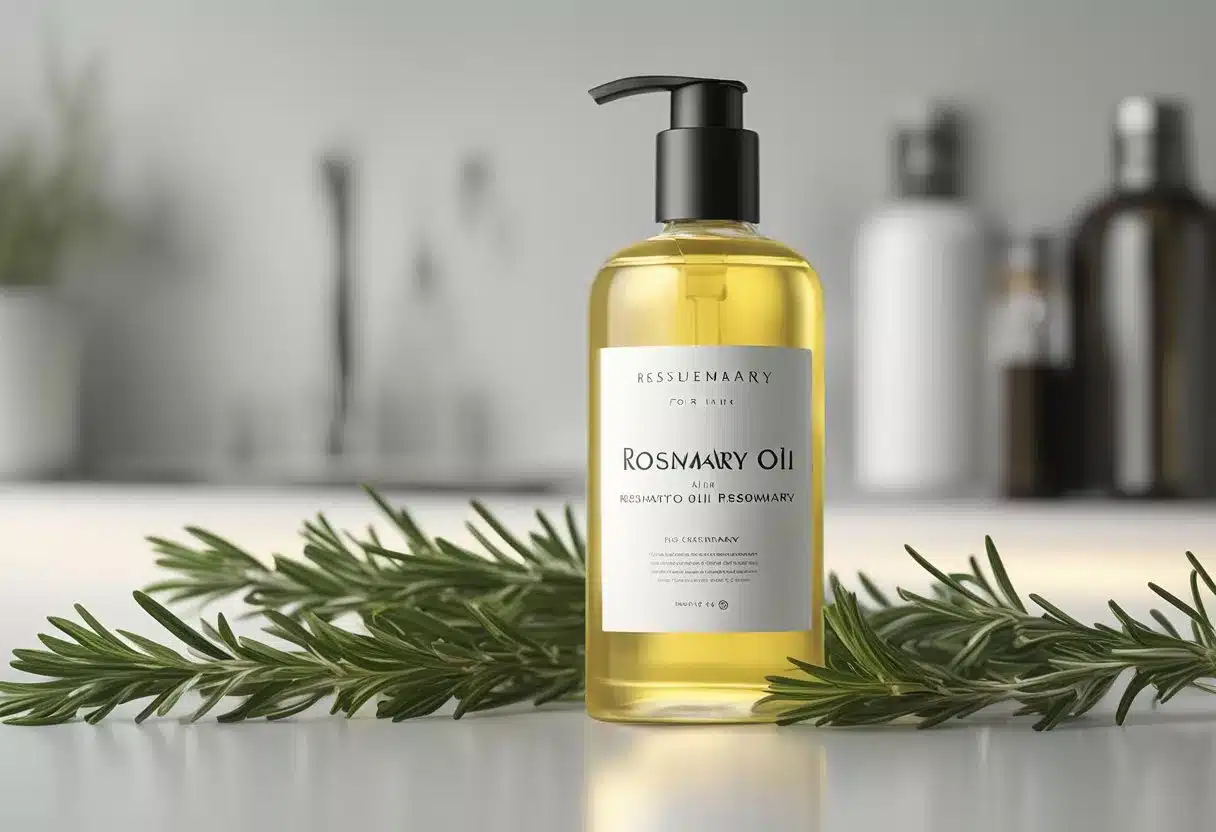Rosemary oil has long been celebrated for its numerous health benefits, but its potential to boost hair growth is drawing particular interest. Studies indicate that rosemary oil may promote hair growth by improving scalp circulation and blocking DHT, a hormone linked to hair loss. From enhancing hair thickness to reducing dandruff, this essential oil offers a natural solution for various hair concerns.
To harness the benefits of rosemary oil, it’s important to know how to use it correctly. Mixing a few drops with a carrier oil and massaging it into the scalp can yield promising results. Regular use not only strengthens hair but also provides a soothing and refreshing experience.
Modern research and traditional practices both support the effectiveness of rosemary oil for hair care. Many experts recommend it as a natural alternative to chemical treatments. Interested in exploring how this essential oil can transform your hair care routine? Read on to uncover the best ways to incorporate rosemary oil into your daily regimen.
Key Takeaways
- Rosemary oil may enhance hair growth and thickness.
- Proper application with a carrier oil is essential.
- It offers a natural alternative to chemical treatments.
The Science Behind Rosemary Oil

Recent studies have looked into how rosemary oil affects hair growth, comparing it to traditional treatments. They have found that rosemary’s active compounds may have some notable benefits.
Hair Growth and Rosemary Oil
Research has shown that rosemary oil might help stimulate hair growth. It contains compounds like carnosic acid and carnosol, which have anti-inflammatory properties that are believed to improve blood flow to hair follicles. Better blood circulation to the scalp can promote healthier hair growth.
One study from 2015 suggested that rosemary oil could be as effective as minoxidil, a popular hair growth treatment. Users in the study experienced increased hair count after six months of use.
Comparison With Traditional Treatments
Comparing rosemary oil to traditional treatments like minoxidil reveals some interesting findings. Minoxidil, an FDA-approved treatment, is typically used for androgenic alopecia (male and female pattern baldness). It works by stimulating hair follicles and extending the growth phase of hair.
A 2015 study found that rosemary oil and minoxidil showed similar results in hair count increase over six months. Both treatments improved hair growth, but rosemary oil comes with fewer side effects, making it a safer option for some.
Alopecia and Rosemary Oil
Alopecia, a condition that involves hair loss, can be treated in various ways, and rosemary oil is becoming a popular alternative. Androgenic alopecia is the most common form, characterized by hair thinning due to the activity of androgens like DHT (dihydrotestosterone).
Rosemary oil may counteract this by blocking the effects of DHT. Additionally, its anti-inflammatory properties help maintain scalp health, which is crucial in preventing hair loss caused by inflammation.
Rosemary’s Active Compounds
Carnosic acid and carnosol are the key active compounds in rosemary oil that contribute to its effectiveness. These compounds have both anti-inflammatory and antioxidant properties. They help mitigate scalp inflammation, which can otherwise lead to hair follicles getting damaged and eventually causing hair loss.
Furthermore, by improving blood circulation, these compounds ensure that hair follicles get adequate nutrients and oxygen, promoting stronger and healthier hair growth.
Using Rosemary Oil for Hair Care

Rosemary oil can enhance hair growth and improve scalp health. Applying it correctly, selecting the right concentrations, and using suitable carrier oils are essential for achieving the best results.
Effective Application Methods
To effectively use rosemary oil, apply it to the scalp and massage gently. This helps increase blood circulation to the hair follicles, promoting hair growth. For best results, let the oil sit on the scalp for a few hours or overnight before washing it out. It can also be added to regular shampoos or conditioners for a milder effect.
It’s important to note that consistent usage is key. Start with one or two applications per week and gradually increase to daily use if tolerated. This gradual approach helps the scalp adjust to the new routine.
Optimal Concentrations for Hair Scalp
Using the correct concentration of rosemary oil is vital to avoid irritation. Typically, five drops of rosemary essential oil per tablespoon of carrier oil is recommended. This ratio ensures that the essential oil is potent enough to be effective without being too strong for the scalp.
For those with sensitive skin, fewer drops can be used. Always conduct a patch test before full application to ensure no adverse reactions occur. This step is crucial to prevent potential scalp irritation or allergic responses.
Carrier Oils for Dilution
When using rosemary oil, it’s necessary to dilute it with a carrier oil. Carrier oils such as jojoba oil and coconut oil are excellent choices due to their nourishing properties. Jojoba oil closely mimics the natural oils of the scalp, making it highly effective for hydration.
Coconut oil has antimicrobial properties and helps penetrate the hair shaft, providing deep conditioning. Using these oils in combination with rosemary essential oil can amplify the benefits, resulting in healthier hair and scalp.
Homemade Hair Care Recipes
Creating homemade hair care products with rosemary oil is both cost-effective and beneficial. An easy recipe for a scalp serum involves mixing five drops of rosemary oil with two tablespoons of coconut oil. Massage this mixture into the scalp and leave it overnight for best results.
For a homemade shampoo, blend a tablespoon of baking soda with a cup of water, then add ten drops of rosemary oil. This mixture can be used to cleanse the scalp while promoting hair growth. Using these simple recipes ensures that you control the ingredients and potency, tailoring them to your specific hair needs.
Benefits and Effects

Rosemary oil has several key benefits for the hair, including promoting thickness, reducing dandruff, preventing premature graying, and enhancing blood circulation.
Promoting Hair Thickness and Health
Rosemary oil helps promote hair growth and thickness. It strengthens circulation, ensuring that hair follicles receive essential nutrients and oxygen. This can lead to healthier, thicker hair. Regular use may help in increasing the thickness of each hair strand. This oil’s anti-inflammatory properties also contribute to a healthier scalp, preventing issues that can disrupt hair growth.
Reducing Dandruff and Scalp Issues
Using rosemary oil can help reduce dandruff and other scalp issues. It has natural anti-inflammatory and antifungal properties, which can calm itchy and flaky scalps. Applying it regularly can help soothe scalp irritation and keep dandruff under control. By maintaining a healthier scalp, rosemary oil indirectly supports overall hair health and growth.
Preventing Premature Graying
Rosemary oil may help prevent premature graying of hair. Regular application can strengthen hair follicles and preserve the natural pigment of the hair. It is thought to support the health of melanin-producing cells, which are responsible for hair color. This makes it a natural option for those looking to maintain their hair’s color longer.
Enhancing Blood Circulation
Rosemary oil improves blood circulation, which is vital for hair growth. Enhanced blood flow to the scalp ensures that hair follicles get more nutrients and oxygen. This supports the overall health of the scalp and hair. Better circulation helps in promoting stronger, shinier hair and may reduce hair loss by invigorating the hair roots.
Safety and Precautions

Using rosemary oil for hair growth can offer benefits, but it is important to be aware of possible side effects, skin irritation, and the need for consulting a dermatologist, especially for those with sensitive skin or underlying conditions.
Possible Side Effects
Rosemary oil is generally safe for most people when used in moderation. Possible side effects can include dryness and itching of the scalp. For pregnant or breastfeeding women, it is best to avoid using essential oils without medical advice.
People with sensitive skin might experience heightened reactions. Always do a patch test before full application to check for any adverse effects. This oil might also not be suitable for those with damaged or chemically treated hair, as it can further dry out the hair strands.
Skin Irritation and Allergic Reactions
Skin irritation can occur when rosemary oil is used in its pure form. Diluting the oil with a carrier oil, such as coconut or olive oil, can help reduce the risk. Even diluted, it’s possible to experience redness, rashes, or burning sensations.
Allergic reactions are rare but possible. Symptoms can include swelling, hives, or difficulty breathing. If any of these symptoms occur, discontinue use immediately and seek medical attention. Always be cautious if you have a history of allergies to plants or oils.
Consulting a Dermatologist
It is wise to consult a dermatologist before adding rosemary oil to your hair care routine. This is particularly important for individuals with scalp conditions like psoriasis or eczema. A dermatologist can provide guidance tailored to your specific skin type and hair health.
For those with sensitive skin or underlying health conditions, professional advice is crucial to avoid exacerbating any issues. Consulting a healthcare professional is highly recommended for those in pregnancy or breastfeeding to ensure safety. Employing expert advice can prevent potential complications and enhance the benefits of rosemary oil for hair care.
Choosing the Right Rosemary Oil Hair Product

Selecting the right rosemary oil hair product can make a big difference for your hair. Different forms of rosemary oil products cater to various needs, so it’s crucial to find the right one for your specific hair type and concern.
Shampoos and Conditioners
Shampoos and conditioners with rosemary oil keep your hair clean while promoting growth. They are especially beneficial for those with greasy scalps as they help balance oil production. Products like Mielle Organics Rosemary Mint Strengthening Conditioner and Aveda’s Rosemary Mint Purifying Shampoo are popular choices.
For color-treated hair, look for formulas that are free from harsh chemicals like sulfates. This helps maintain the color while still benefiting from rosemary oil. L’Oréal Paris offers some options designed for maintaining vibrant color while nourishing the scalp.
If you experience a dry scalp or dandruff, a shampoo with rosemary and peppermint might be soothing. It not only cleans the scalp but also provides a refreshing sensation.
Serums and Oils
Serums and oils are more concentrated and can be directly applied to the scalp or hair. These products are ideal for targeted scalp treatment and hair nourishment. Mielle Organics Rosemary Mint Scalp & Hair Oil is a well-loved option for enhancing growth.
Camille Rose offers a rich blend that combines rosemary oil with other natural ingredients. These are perfect for massages that stimulate blood flow to the scalp. Applying a few drops of pure rosemary essential oil, like those from Public Goods, can also be effective.
Remember, using too much oil can weigh down fine hair, so start with a small amount and adjust according to your hair’s response. For thicker or curly hair, a generous amount might be needed to cover and protect each strand.
Selecting for Hair Type
Choosing a rosemary oil product that suits your hair type is essential. Fine hair can benefit from lightweight formulas like sprays or mists that do not weigh down the hair. Aromatica Rosemary Root Enhancer Spray could be a good option for this.
For curly or coily hair, opt for richer oils and creams. These products provide the extra moisture needed to keep curls defined and frizz-free. Camille Rose products often suit these hair types well.
If you have color-treated hair, always check for sulfate-free labels to prevent stripping the color. Lightweight oils or leave-in treatments can help maintain the color while providing nourishment.
Understanding your hair’s needs will help you choose the most effective rosemary oil product. Whether it’s a shampoo, serum, or a specialized product, each type has unique benefits catered to different hair concerns.
Cultural and Historical Context

Rosemary oil, derived from the Rosmarinus officinalis plant, has a rich history in the Mediterranean region. This section explores its origins and traditional uses in hair care.
Origin in the Mediterranean Region
Rosemary, or Rosmarinus officinalis, is native to the Mediterranean region. It has been a staple in Mediterranean cultures for centuries, used in everything from culinary dishes to medicinal remedies. Ancient Greeks and Romans valued rosemary for its purported memory-enhancing properties and often used it in religious rituals and weddings.
The plant thrives in the rocky, coastal areas of the Mediterranean. The warm, dry climate is ideal for its growth. Historical records show that rosemary was grown in gardens and used in various cultural practices, including in baths and incense.
Traditional Uses in Hair Care
In many Mediterranean cultures, rosemary oil was an essential part of hair care routines. The oil, believed to stimulate hair growth and improve scalp health, was used by massaging it into the scalp to increase blood circulation to the hair follicles.
People also infused rosemary leaves in water to create hair rinses. These rinses were thought to darken hair, add shine, and strengthen strands. The anti-inflammatory and antioxidant properties of rosemary, specifically its carnosic acid and carnosol, were highly prized for keeping hair healthy.
Traditional remedies often combined rosemary with other natural ingredients like olive oil and honey to create nourishing treatments. This practice is still popular today, and many modern hair care products feature rosemary oil due to its historical significance and proven benefits.
Contemporary Discussions and Trends

Rosemary oil for hair has become a hot topic, influenced largely by social media and the innovations of notable hair care brands. This section explores these influences and highlights some key players in the market.
Influence of Social Media
Platforms like TikTok and Instagram have played a huge role in popularizing rosemary oil for hair growth. On TikTok, the rosemary oil hack has gone viral, with influencers and users sharing their positive experiences. A TikTok viral trend[1] suggests that a $10 bottle can significantly improve hair health.
Instagram also showcases influencers recommending rosemary oil. Dermatologists’ endorsements of these trends add credibility. This mix of personal testimony and professional approval has made rosemary oil a must-try for hair care enthusiasts.
Notable Brands and Innovations
Several brands have tapped into the rosemary oil trend. Mielle Organics and Camille Rose are well-known for their natural hair care products, often featuring rosemary oil. L’Oréal Paris has introduced formulations combining rosemary oil with other beneficial ingredients to enhance hair health.
Retail availability of rosemary oil-infused products has increased, reflecting its growing popularity. Innovations include blends with carrier oils like jojoba or argan, enhancing the benefits of rosemary oil. These brands not only promote hair growth but also cater to diverse hair care needs, making rosemary oil a versatile choice in the market.
Complementary Natural Remedies

Using rosemary oil on hair can be enhanced with other natural remedies. Different essential oils can be mixed with rosemary oil, and focusing on a nutrient-rich diet can also improve hair health.
Supplementing with Other Essential Oils
Lavender Oil: Known for its calming scent, lavender oil can improve hair growth and thickness. It can be combined with rosemary oil in a carrier oil like olive oil or avocado oil.
Peppermint Oil: Peppermint oil increases circulation to the hair follicles, similar to rosemary oil. Use a few drops with rosemary oil and massage it into the scalp to stimulate hair growth.
Tea Tree Oil: With antimicrobial properties, tea tree oil can reduce dandruff and unblock hair follicles. Mix it with rosemary oil and a carrier like argan oil for added benefits.
Pumpkin Seed Oil: This oil is rich in fatty acids and can be used alongside rosemary oil to moisturize the scalp. It helps to reduce hair loss and promote hair growth.
Diet and Nutrition for Hair Health
Proteins: Hair is primarily made of protein, so consuming adequate protein from sources like lean meats, beans, and nuts is important.
Vitamins and Minerals: Vitamins A, C, D, and E, along with minerals like zinc and iron, are crucial for hair health. Leafy greens, citrus fruits, and whole grains can provide these nutrients.
Healthy Fats: Omega-3 fatty acids found in fish, flaxseeds, and walnuts support scalp health. Including avocado oil and olive oil in the diet also promotes healthy hair.
Hydration: Drinking enough water daily keeps the scalp hydrated and aids in transporting nutrients to hair follicles.
Eating a balanced diet rich in these nutrients, combined with the use of essential oils, can significantly boost hair health and growth.
Final Considerations

Rosemary oil has gained attention for its potential benefits in hair growth and scalp health. Key areas to assess include regulatory aspects and the need for further scientific research.
Regulatory Aspects and FDA Approval
Rosemary oil is commonly used in hair care, but it is essential to note that the FDA has not officially approved it as a treatment for hair loss. The FDA’s primary role is to ensure that medications and treatments are safe and effective. Because rosemary oil is considered a cosmetic product, it does not require the same stringent approval process as pharmaceuticals. This means consumers should use it carefully and be aware of possible allergic reactions. Always patch-test before full use, and consult with a healthcare provider if unsure.
Future Research and Potential
The benefits of rosemary oil have shown promise in various studies, but more research is needed to fully understand its efficacy for hair growth. Current studies highlight how rosemary oil can improve circulation and stimulate nerve growth, potentially aiding hair health. Researchers are exploring its anti-inflammatory and antimicrobial properties, which might benefit scalp conditions. Future studies should aim for larger sample sizes and more controlled trials to validate these findings. Continuous research will help clarify the potential of rosemary oil as a mainstream treatment for hair-related issues, possibly leading to more official endorsements and recommendations.
Frequently Asked Questions

Rosemary oil can benefit hair growth, improve hair thickness, and treat hair loss. Knowing how to use it effectively, how to mix it, and how often to apply it are essential for optimal results.
How to use rosemary oil for hair growth?
Rosemary oil can be applied directly to the scalp. It’s often recommended to mix it with a carrier oil like coconut or olive oil. Massage the mixture into the scalp for several minutes to stimulate blood flow and promote hair growth.
What are the benefits of using rosemary oil for hair?
Rosemary oil has antimicrobial, anti-inflammatory, and antioxidant properties. These benefits help stimulate hair growth, improve circulation, and soothe the scalp. It’s particularly helpful for people experiencing hair breakage or shedding.
Can rosemary oil improve hair thickness and treat hair loss?
Yes, rosemary oil can help improve hair thickness and treat hair loss. It stimulates blood circulation to the scalp, which promotes healthier and thicker hair growth. Always consult a dermatologist to determine the cause of hair loss before starting treatment.
What is the best way to mix rosemary oil for use in hair treatments?
The best way to mix rosemary oil is to dilute it with a carrier oil such as coconut or olive oil. Use a few drops of rosemary oil with a tablespoon of the carrier oil. This mixture should then be massaged into the scalp for a few minutes.
How often should rosemary oil be applied for optimal hair growth?
For optimal hair growth, rosemary oil should be used regularly. It’s commonly suggested to apply the oil mixture once or twice a week. Some experts recommend letting the oil sit overnight and washing it out in the morning.
References
- TikTok viral trend. https://www.instyle.com/hair/haircare/tiktok-hair-trend-rosemary-oil-benefits Accessed October 20, 2025